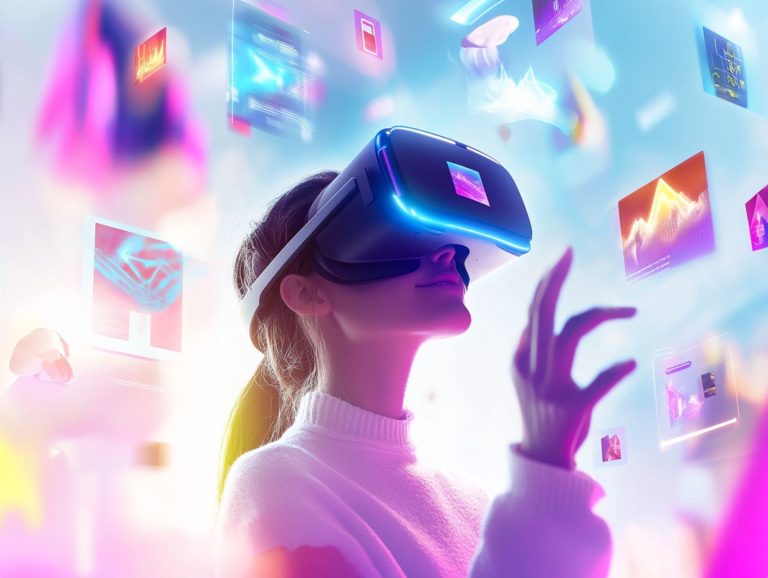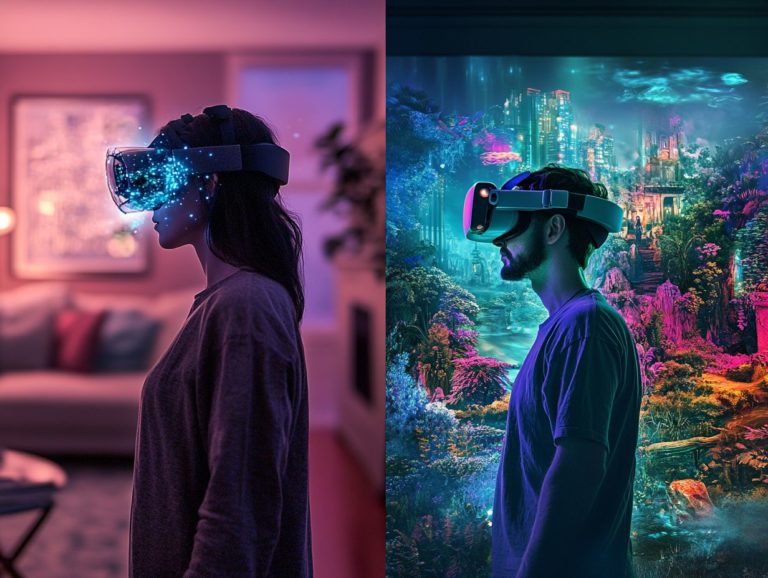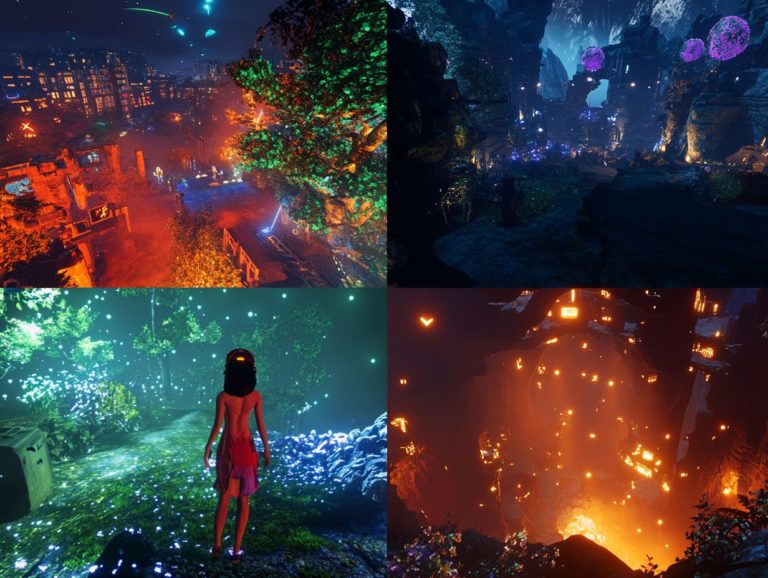the impact of vr on the gaming industry
Virtual reality (VR) gaming has revolutionized the world of interactive entertainment. It blends technology with creativity to create extraordinary experiences.
From its inception to today s exciting new developments, VR captivates players with heightened immersion and realism.
However, this progress comes with challenges. Technical limitations and health concerns are still relevant issues.
As you explore the evolution of VR technology, examining its advantages and obstacles, you ll see how it is transforming gaming culture and what the future holds for this thrilling medium.
Contents
Key Takeaways:
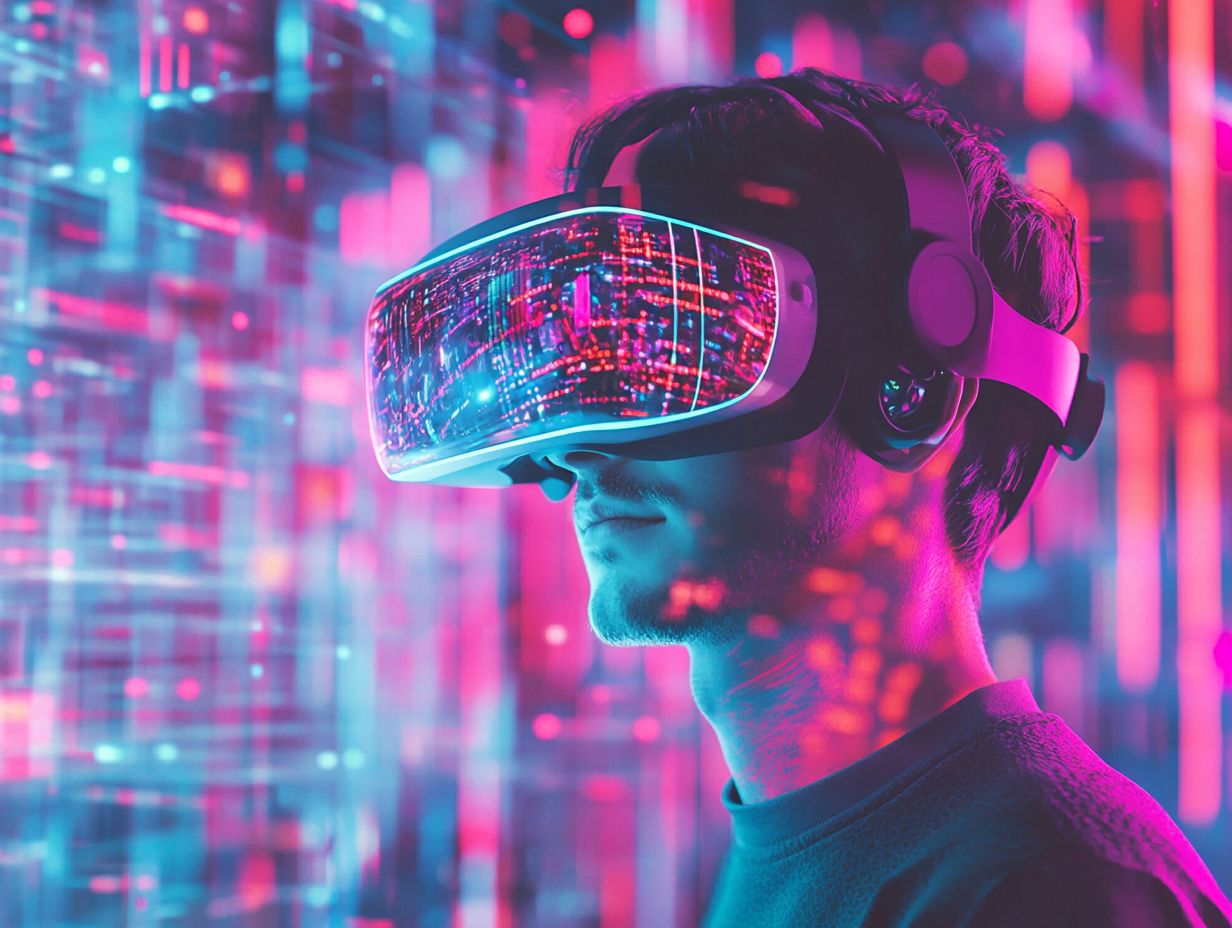
- VR gaming provides a highly immersive and realistic experience for players.
- It enhances gameplay and user experience, boosting overall enjoyment.
- While challenges such as technical and financial constraints exist, the future of VR in gaming is incredibly exciting with expected growth and innovation.
What is VR Gaming?
VR gaming is a groundbreaking dimension of the gaming industry. It transports players into immersive virtual worlds, offering unique experiences across various genres.
By harnessing VR technology, you interact with 3D environments that significantly boost player engagement and enjoyment.
Innovations like VR headsets and motion controllers make this interactive gameplay not just accessible but captivating. In this virtual landscape, genres such as first-person shooters, adventure, and puzzle games shine, with titles like Half-Life Alyx setting new benchmarks for immersive gameplay.
The impact of advanced VR hardware is immense. High graphics resolution and responsive motion tracking elevate your experience to exhilarating new heights. Gaming accessories such as haptic gloves provide tactile feedback, allowing your actions to feel astonishingly lifelike.
Engaging with online communities further enriches this experience, letting you share tips, strategies, and unforgettable moments while fostering a sense of belonging in this ever-evolving digital realm.
A Journey Through VR Gaming History
The history of VR in gaming is a remarkable journey filled with exciting new developments. It began with early prototypes and has blossomed into the success of devices like the Oculus Rift, HTC Vive, and PlayStation VR.
As VR technology evolved, it opened the door to immersive experiences that captivated gamers and transformed how video games are played. Companies like Valve played a vital role in this evolution, particularly with innovative titles such as Half-Life Alyx, which brilliantly showcased VR’s immense potential.
Evolution of VR Technology
The evolution of VR technology has transformed the gaming landscape, establishing a foundation for experiences that once seemed distant.
From rudimentary devices to cutting-edge systems, advancements continue to push the boundaries of gaming, enriching user experiences and enhancing interactions in virtual environments.
Notably, increased graphics resolution has elevated realism, making you feel as if you truly belong in these alternative worlds.
Improved motion controllers provide precision in gameplay, making interactions not just intuitive but deeply engaging.
These innovations attract individual gamers and expand VR’s appeal in casual and competitive settings.
As a result, companies eagerly invest in the VR market, spurring breakthroughs that promise to redefine gaming, education, training simulations, and social interactions in virtual spaces.
Benefits of VR Gaming
The benefits of VR gaming extend far beyond entertainment, providing you with an immersive experience that enhances engagement and enjoyment.
With VR technology, you navigate lifelike environments, fostering deeper interactions and emotional connections in your gameplay.
These cutting-edge systems amplify the excitement of multiplayer gaming and open new avenues for exploration and creativity, transforming your experience into something truly extraordinary.
Ready to dive into the world of VR gaming? Experience the thrill for yourself!
Enhanced Immersion and Realism
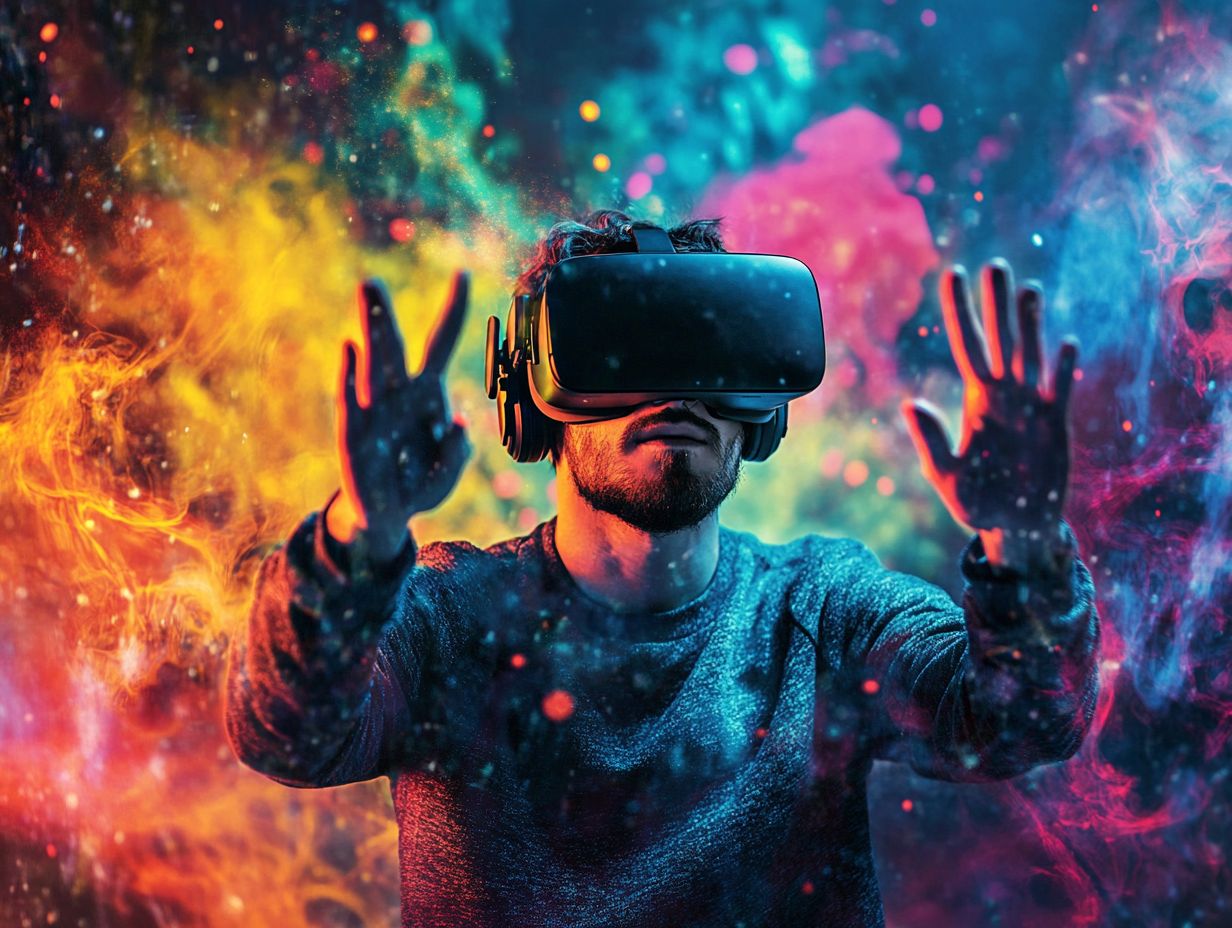
Enhanced immersion and realism rank among the most significant advantages of VR gaming. They offer you an unparalleled level of engagement through advanced VR headsets and cutting-edge graphics.
This technology crafts lifelike simulations that make you feel as if you’re genuinely part of the virtual world. This deepens your emotional investment in the game.
To elevate this experience even further, various gaming accessories are important for making you feel present in the game.
- Motion controllers, for instance, allow you to interact with the environment in intuitive ways. This makes your actions feel more natural and responsive.
- Games like *Half-Life Alyx* brilliantly utilize these controllers. You can grasp objects, manipulate your surroundings, and engage in combat making the game even more exciting.
- Haptic feedback devices let you feel what happens in the game, like vibrations when you shoot a gun. They provide tactile sensations that mirror in-game actions.
So, when you fire a weapon or open a door, you physically feel these events. This fosters a deeper connection to the virtual experience.
Improved Gameplay and User Experience
Improved gameplay and user experience are vital outcomes of advancements in VR gaming technology. This enables you, as a player, to engage with interactive gameplay that truly captivates.
This transformation enhances traditional gaming mechanics and introduces innovative elements that redefine your expectations for a gaming experience. You can enjoy deeper engagement and exploration within virtual worlds.
As a result, various genres, including adventure games and first-person shooters, have evolved significantly.
In adventure games, you can now immerse yourself fully in rich narratives and dynamic environments. Every decision you make shapes the outcome.
Meanwhile, first-person shooters utilize VR’s immersive capabilities to deliver intense, realistic combat scenarios. This amplifies the thrill of gameplay.
By prioritizing user-centric designs, game developers cultivate environments that encourage your creativity, interaction, and problem-solving. This ultimately leads to unique and memorable experiences that resonate long after you ve set down the headset.
Challenges and Limitations of VR Gaming
Even with great progress in VR gaming, you’ll find that several challenges and limitations hinder its widespread adoption and accessibility.
Technical constraints, such as demanding hardware requirements and the steep price tags of VR devices, can deter potential users. Financial limitations are a major barrier, restricting ongoing innovation and development within the gaming industry.
Technical and Financial Constraints
Technical and financial constraints pose significant challenges in the world of VR gaming. The need for high-quality VR headsets and robust gaming systems can be quite prohibitive.
This makes it difficult for many potential players to dive in. Additionally, the financial investment required for game developers to create optimized VR applications often limits the available content across various gaming platforms.
These hurdles affect you and other gamers. You could miss out on amazing experiences due to budget limitations.
To address these issues, developers could explore creating more affordable hardware options or utilizing cloud gaming technologies. This can alleviate the need for powerful local systems.
By fostering partnerships between tech companies and indie developers, there’s potential to spark innovation. This could lead to a broader array of high-quality VR content that appeals to a wider audience and helps demystify the barriers to entry.
Health and Safety Concerns
Health and safety concerns have become increasingly pertinent in the world of VR gaming. Prolonged exposure to realistic game worlds can lead to issues like motion sickness, eye strain, and disorientation.
Understanding these challenges is essential for you as a player. It’s critical for developers to create safer gaming environments that enhance your well-being.
Many players report symptoms such as headaches or fatigue after long sessions. This underscores the need for regular breaks to rest your eyes and cognitive functions.
Developers must implement features that remind you to take breaks. They carry a significant responsibility to prioritize your health.
Developers can add adjustable settings. This allows you to customize your experience and helps reduce discomfort. Addressing health concerns means that the gaming industry prioritizes your safety while cultivating a more enjoyable VR experience for everyone involved.
The Future of VR in Gaming

The future of VR in gaming looks exceptionally promising. Innovations are set to transform the gaming landscape once more.
As new technologies emerge, game developers will push the limits of realism and immersive experiences. You ll be drawn into virtual worlds in ways you ve never imagined.
Get ready to dive into exciting new gaming adventures that will blow your mind!
Expected Growth and Innovations
Growth and innovations in VR gaming will largely arise from advancements in VR systems and gaming platforms. This will enhance your user experience and accessibility as a player.
With more developers pouring resources into this technology, the potential for unique gaming experiences will expand significantly. New avenues for immersive gameplay will open up.
Innovations in user interface design and interaction mechanics will make it easier for you to navigate virtual worlds. Software components are evolving to support more complex environments.
This enables developers to create expansive narratives that captivate a wider audience. Community-driven initiatives, like collaborative multiplayer experiences, are also on the rise.
These advancements promise to elevate VR gaming’s quality and cultivate a more interconnected gaming community. You ll effortlessly share experiences and achievements with others.
Impact of VR on the Gaming Industry
The impact of VR on the gaming industry is transformative, as it drives significant shifts in gaming culture and redefines market dynamics. To explore this further, consider reading about the future of VR in gaming.
As immersive technologies gain momentum, they pave the way for vibrant online communities. These communities share a passion for VR gaming.
This burgeoning interest profoundly influences both game development and player engagement strategies. Together, they create a rich tapestry of experiences that elevate the gaming landscape.
Changes in Gaming Culture and Market
Changes in gaming culture and market dynamics are linked to the rise of VR gaming. You now seek more interactive and immersive experiences that foster meaningful player interaction.
This shift has given rise to vibrant online communities. They thrive on shared passions for VR technologies and gaming genres.
Titles like “Beat Saber” and “Half-Life: Alyx” exemplify how immersive storytelling and physical engagement elevate your expectations as a player.
As VR technology advances, developers are adopting user-centric approaches. They prioritize your feedback to create engaging environments and enhanced interactivity.
Trends such as cross-platform compatibility and social VR spaces are becoming essential. These trends allow you to connect and interact seamlessly with fellow gamers, enriching your overall gaming experience.
It s evident that VR has transformed how games are played and redefined the entire gaming ecosystem.
Frequently Asked Questions
- What are the main health concerns in VR gaming?
- How can developers improve VR safety?
- What innovations can we expect in VR gaming?
- How does VR impact gaming culture?
What is VR and how does it impact the gaming industry?
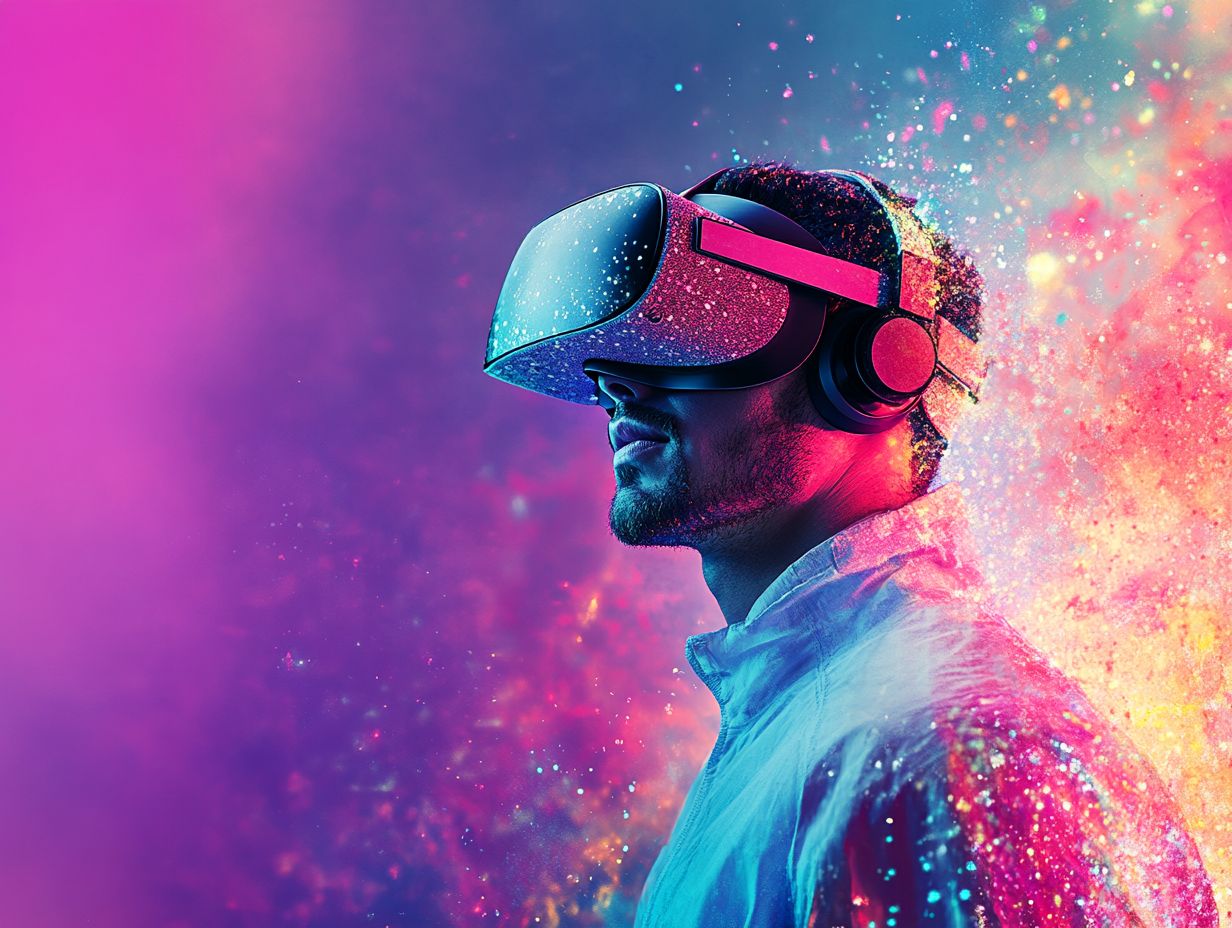
VR, or virtual reality, is a technology that creates a simulated environment you can interact with. Its impact on gaming is significant, enhancing the experience and allowing for interactive gameplay.
How does VR affect the gameplay experience?
VR technology lets players immerse themselves in the game world. This makes gameplay more realistic and engaging, making players feel like they are actually inside the game.
What are the advantages of using VR in gaming?
VR offers benefits such as better immersion and more realistic graphics. It encourages innovative game designs and can attract a wider audience.
How has VR impacted game development?
Integrating VR has led to the creation of more complex and immersive games. Developers now have tools to craft interactive and realistic worlds, providing players with a dynamic experience.
What challenges does VR face in gaming?
Despite its benefits, VR presents challenges. Concerns about cost, accessibility, and health risks remain. Developers must also address gameplay mechanics and technical issues.
How will VR shape the future of gaming?
The demand for VR in gaming is expected to grow. It has the potential to transform the gaming experience, paving the way for more innovative and immersive games.

